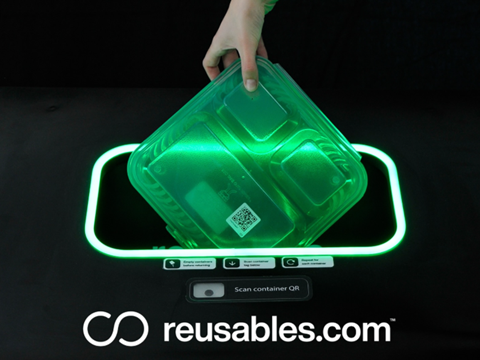
Credit: @reusables_takeout, Instagram
Reusables.com’s RFID-enabled, zero-deposit reuse system supplies reusable foodservice containers and smart return bins to university campuses, offices, hospitals, and other institutions in hopes of reducing single-use waste and streamlining operational costs.
The system is designed to negate the need for deposits, apps, tokens, and other ‘barriers to reuse’. Due to its ‘container agnostic’ approach, Reusables.com offers to help customers find the right plastic or metal containers for their food service applications.
By scanning their credit card, student card, or employee card on a checkout device at point-of-sale, consumers can assign a reusable pack to their ID without additional sign-ups. The system is designed to integrate with common payment and credential systems, including Transact, CBORD, Touchnet, and Atrium.
Empty containers can then be returned to a smart bin or taken to another designated area equipped with an RFID reader. Every scan of an on-pack QR code automatically updates the user’s account and they receive a 100% refund – charges only apply if a container isn’t returned within an allotted time frame.
Since its door only opens for reusables, the bin avoids contamination and stays clean. Staff can empty it by removing the liner and replacing it with a fresh one, then pressing a button to reset the bin capacity.
Existing commercial dishwashers can be used to clean the containers. Washing them on-site is expected to ensure high turnover rates and avoid extra emissions from transporting used packaging to off-site facilities.
Apparently, all the containers and tracking tags Reusables.com recommends can be cleaned over 500 times, and stainless steel options are expected to withstand over 1000 cycles.
Reusable.com’s system anticipates a 99% return rate and aims to unlock ‘reliable and cost-effective’ tracking on a container level. Customers are set to save over 50% on their packaging costs while cutting down on waste and alleviating strain caused by traditional waste management and cleaning processes.
Changes to existing food packing processes are not required, the company’s website clarifies, and the solution is described as ‘easy to install’ with a starter kit consisting of containers, a checkout device, and smart bins.
Reusables.com recommends the solution as a customizable alternative to single-use takeaway packaging intended to align with increasing consumer demand for climate-conscious solutions.
Another QR-driven reuse system from Borro is designed for events such as football games. Consumers pay for their beverage and an additional deposit at point-of-sale, then return the empty cups to self-service checkout points to be automatically processed. Refunds are paid directly into the user’s bank account or to designated cards or bracelets used for the event.
In other news, big brands like The Coca-Cola Company, Starbucks, and PepsiCo recently participated in the Petaluma Reusable Cup Project. By serving reusable cups as the default at over thirty restaurants during a city-wide trial, they claimed to achieve a 51% return rate and eliminate ‘hundreds of thousands’ of single-use cups.
If you liked this story, you might also enjoy:
The ultimate guide to the Packaging and Packaging Waste Regulation in 2025
How are the top brands progressing on packaging sustainability?
Everything you need to know about global packaging sustainability regulation in 2025
The key to increasing the use of reusable packaging in supermarkets













No comments yet